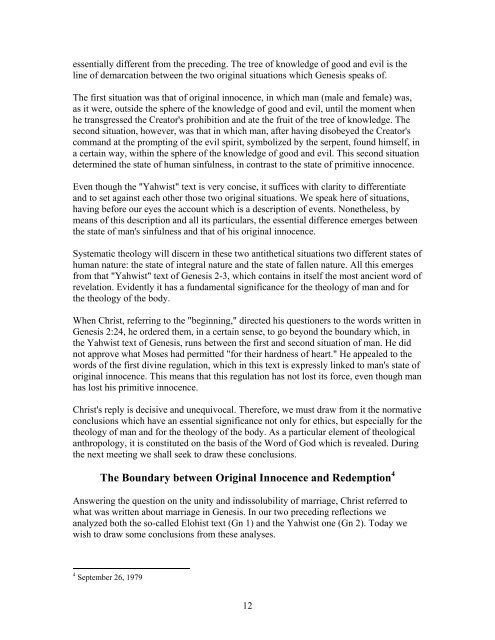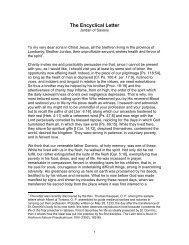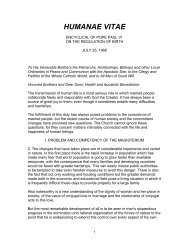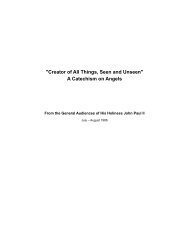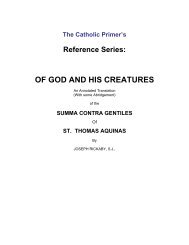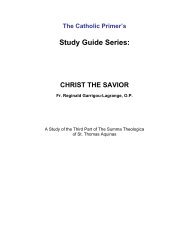The Theology of the Body by John Paul II - The Catholic Primer
The Theology of the Body by John Paul II - The Catholic Primer
The Theology of the Body by John Paul II - The Catholic Primer
You also want an ePaper? Increase the reach of your titles
YUMPU automatically turns print PDFs into web optimized ePapers that Google loves.
essentially different from <strong>the</strong> preceding. <strong>The</strong> tree <strong>of</strong> knowledge <strong>of</strong> good and evil is <strong>the</strong><br />
line <strong>of</strong> demarcation between <strong>the</strong> two original situations which Genesis speaks <strong>of</strong>.<br />
<strong>The</strong> first situation was that <strong>of</strong> original innocence, in which man (male and female) was,<br />
as it were, outside <strong>the</strong> sphere <strong>of</strong> <strong>the</strong> knowledge <strong>of</strong> good and evil, until <strong>the</strong> moment when<br />
he transgressed <strong>the</strong> Creator's prohibition and ate <strong>the</strong> fruit <strong>of</strong> <strong>the</strong> tree <strong>of</strong> knowledge. <strong>The</strong><br />
second situation, however, was that in which man, after having disobeyed <strong>the</strong> Creator's<br />
command at <strong>the</strong> prompting <strong>of</strong> <strong>the</strong> evil spirit, symbolized <strong>by</strong> <strong>the</strong> serpent, found himself, in<br />
a certain way, within <strong>the</strong> sphere <strong>of</strong> <strong>the</strong> knowledge <strong>of</strong> good and evil. This second situation<br />
determined <strong>the</strong> state <strong>of</strong> human sinfulness, in contrast to <strong>the</strong> state <strong>of</strong> primitive innocence.<br />
Even though <strong>the</strong> "Yahwist" text is very concise, it suffices with clarity to differentiate<br />
and to set against each o<strong>the</strong>r those two original situations. We speak here <strong>of</strong> situations,<br />
having before our eyes <strong>the</strong> account which is a description <strong>of</strong> events. None<strong>the</strong>less, <strong>by</strong><br />
means <strong>of</strong> this description and all its particulars, <strong>the</strong> essential difference emerges between<br />
<strong>the</strong> state <strong>of</strong> man's sinfulness and that <strong>of</strong> his original innocence.<br />
Systematic <strong>the</strong>ology will discern in <strong>the</strong>se two anti<strong>the</strong>tical situations two different states <strong>of</strong><br />
human nature: <strong>the</strong> state <strong>of</strong> integral nature and <strong>the</strong> state <strong>of</strong> fallen nature. All this emerges<br />
from that "Yahwist" text <strong>of</strong> Genesis 2-3, which contains in itself <strong>the</strong> most ancient word <strong>of</strong><br />
revelation. Evidently it has a fundamental significance for <strong>the</strong> <strong>the</strong>ology <strong>of</strong> man and for<br />
<strong>the</strong> <strong>the</strong>ology <strong>of</strong> <strong>the</strong> body.<br />
When Christ, referring to <strong>the</strong> "beginning," directed his questioners to <strong>the</strong> words written in<br />
Genesis 2:24, he ordered <strong>the</strong>m, in a certain sense, to go beyond <strong>the</strong> boundary which, in<br />
<strong>the</strong> Yahwist text <strong>of</strong> Genesis, runs between <strong>the</strong> first and second situation <strong>of</strong> man. He did<br />
not approve what Moses had permitted "for <strong>the</strong>ir hardness <strong>of</strong> heart." He appealed to <strong>the</strong><br />
words <strong>of</strong> <strong>the</strong> first divine regulation, which in this text is expressly linked to man's state <strong>of</strong><br />
original innocence. This means that this regulation has not lost its force, even though man<br />
has lost his primitive innocence.<br />
Christ's reply is decisive and unequivocal. <strong>The</strong>refore, we must draw from it <strong>the</strong> normative<br />
conclusions which have an essential significance not only for ethics, but especially for <strong>the</strong><br />
<strong>the</strong>ology <strong>of</strong> man and for <strong>the</strong> <strong>the</strong>ology <strong>of</strong> <strong>the</strong> body. As a particular element <strong>of</strong> <strong>the</strong>ological<br />
anthropology, it is constituted on <strong>the</strong> basis <strong>of</strong> <strong>the</strong> Word <strong>of</strong> God which is revealed. During<br />
<strong>the</strong> next meeting we shall seek to draw <strong>the</strong>se conclusions.<br />
<strong>The</strong> Boundary between Original Innocence and Redemption 4<br />
Answering <strong>the</strong> question on <strong>the</strong> unity and indissolubility <strong>of</strong> marriage, Christ referred to<br />
what was written about marriage in Genesis. In our two preceding reflections we<br />
analyzed both <strong>the</strong> so-called Elohist text (Gn 1) and <strong>the</strong> Yahwist one (Gn 2). Today we<br />
wish to draw some conclusions from <strong>the</strong>se analyses.<br />
4 September 26, 1979<br />
12


